Spider-view: Amazing Spider-Man: Soul of the Hunter
This powerful graphic novel brings closure to a long-standing enmity between two fierce foes
—by Nathan on January 13, 2024—
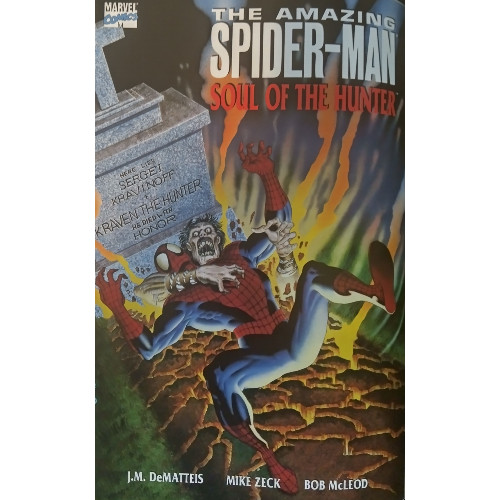
In my review of Ann Nocenti's crossover story arc "Life in the Mad Dog Ward," I momentarily lamented her lack of direct connections to the arc immediately preceding hers, the famous "Kraven’s Last Hunt." Such an event, I argued, should have had a greater impact on Spidey's mentality than Nocenti led readers to believe. Considering, during "Last Hunt," our hero was not only drugged and buried alive for two whole weeks but also experienced the suicide of one of his oldest foes and the man who put him in the earth and left him for dead, Spidey should have appeared a bit more shaken up.
Fear not, True Believers, because we finally get a glimpse into the aftermath of "Kraven’s Last Hunt" in this original graphic novel. Published five years after "Last Hunt," Soul of the Hunter explores the aftermath of J.M. DeMatteis and Mike Zeck's thrilling saga, just a tad later than I hoped the Spider-Man mythos would address it. And just to add a spider-flavored cherry on top, the same creative team responsible for that tale returns for this "sequel."
Amazing Spider-Man: Soul of the Hunter
Writer: J.M. DeMatteis
Penciler: Mike Zeck
Inker: Bob McLeod
Colorist: Steve Buccalleto
Letterer: Rick Parker
Issue: Amazing Spider-Man: Soul of the Hunter Original Graphic Novel (OGN)
Publication Date: August 1992
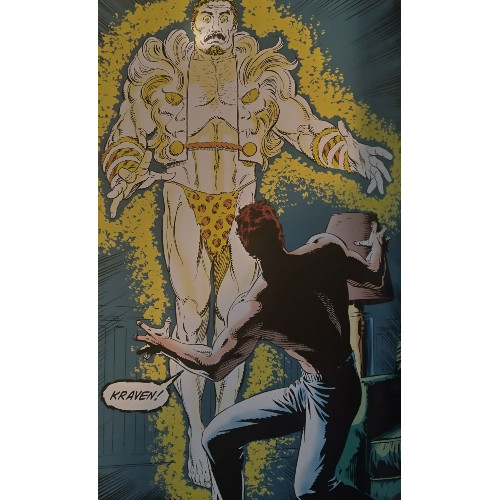
From what I've read briefly on the internet, DeMatteis has been quoted as saying that Soul of the Hunter was written in response to fan backlash over Kraven the Hunter's death. "Last Hunt" infamously ends with the Hunter committing suicide after defeating and usurping Spider-Man, having at last fulfilled what he believed to be his purpose and seeking the arms of death as a way to peacefully move on from his hectic existence. The backlash over his suicide, therefore, seems pretty understandable. Death in Spidey comics doesn't occur infrequently or without reason, but for a character like Kraven to end his life in such a sudden and dramatic fashion is a shocking moment in the original story, and given all the moral and religious implications with suicide, is certainly something that could raise concern.
Given this is the reason for DeMatteis writing "Soul," I applaud his efforts. I recall reading an introduction by Gerry Conway to the "Ultimate Spider-Man" volume containing Brian Michael Bendis and Mark Bagley’s version of the "Clone Saga" a few years ago; Conway describes the decision to revive the character of Gwen Stacy during the original "Clone Saga" in the 70s after her death at the hands of the Green Goblin was, in part, due to fan backlash. So in a classic case of "be careful what you wish," Conway gave fans what they wanted–a living Gwen Stacy–even if she was just a duplicate of the original young woman. I don't know if DeMatteis considered doing something like resurrecting Kraven for Soul, but considering this story was written in response to the fans, I think the way he maneuvers the narrative is unique and gives reader what they want instead of jumping the shark by just bringing Kraven back to life and, essentially, undoing his death. Here, we get closure. Resurrection would just indicate backpedaling. DeMatteis sticks to his guns (no pun intended), offering the original decision more heft.
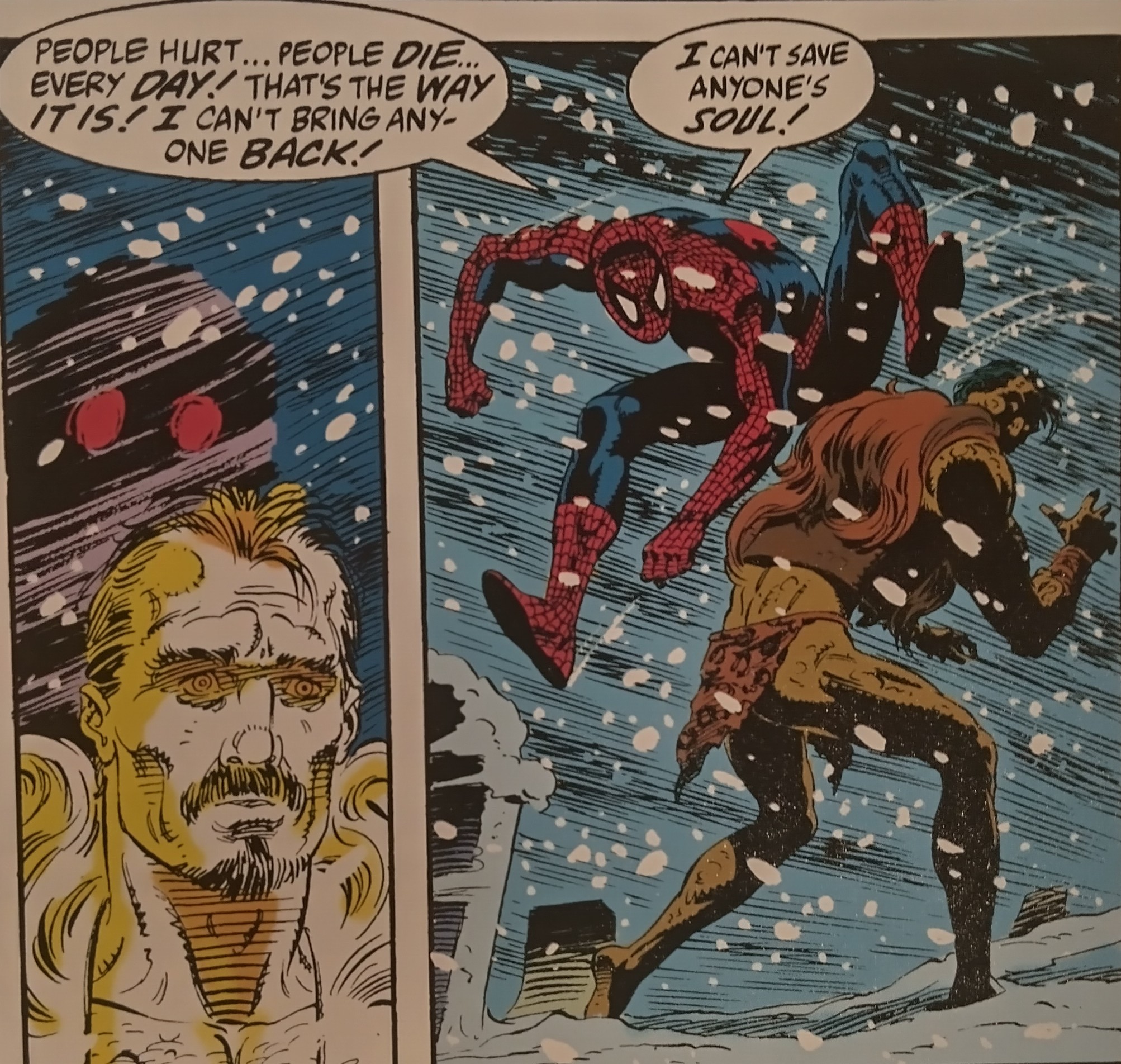
DeMatteis' story follows Peter as he struggles with not only memories of being buried alive but also the guilt associated with Kraven's self-inflicted demise. This–This–is what I was hoping to see in stories immediately following "Last Hunt." Though I acknowledge Soul written five years later, I can only imagine DeMatteis intended this story to take place shortly after the end of his celebrated saga, with Peter still tormented over his ordeal. DeMatteis masterfully weaves in Peter's emotional struggles in a way that feels akin to PTSD. He and MJ attend a funeral, making him think of his own "death" by Kraven; rescuing a kid from a pit he falls into brings flashbacks of Spidey clawing his way out of the grave, culminating in the Web-Head screaming "TWO WEEKS!" at the skies as he recalls the time he lost because of Kraven's actions. Visually and verbally, DeMatteis and artist Mike Zeck nicely depict Spidey's pain, showing us the lingering and unintended side-effects of Kraven's machinations. In a medium that always feels like it's moving from "One Big Thing" to "The Next Big Thing," DeMatteis and Zeck's efforts at slowing down and unpacking Spidey's thoughts and anguish make for powerful storytelling.
The tale picks up the pace a bit in the middle, as Spidey encounters what may be a personification of Death, who urges Spidey to take on a task: forgive Kraven, whose soul is wandering the Earth, unable to reach the afterlife because of the nature of his demise. Initially, Spidey refuses. When I first read this story, I was sort of aghast–this is Spider-Man we're talking about! The Boy Scout in the red-and-blue pajamas! Could he really be so selfish as to deny Kraven the peace his soul seeks? As I reread, however, things became clearer: as much of a Boy Scout as Spidey is, as much of a self-sacrificial hero as he comes off as, he's also human. He makes mistakes, has lapses of judgement, takes time to choose the right decision. If someone buried you alive and left you for dead, sapping two weeks of your life and replacing you with a more sinister version of yourself, how would you respond? With forgiveness? I certainly wouldn’t.
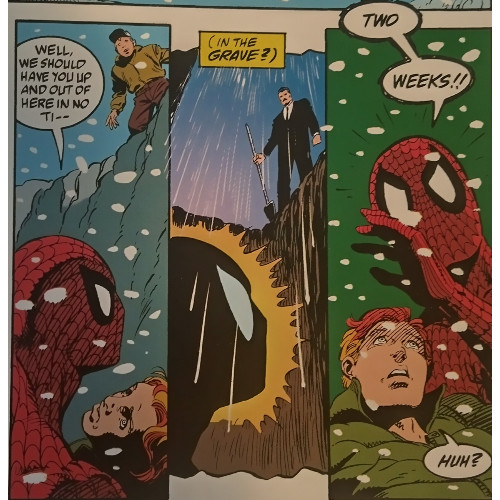
Spidey is, eventually, convinced to face his inner demons and forgive Kraven, which tethers back in to the point I was making earlier. "Closure" is a difficult thing to produce in comics, I believe, because of the ongoing nature of the medium. You can wrap up a book series like "Harry Potter" with all your subplots resolved, characters fully grown, and happy endings liberally distributed like holy water sprinkled over attendees at mass. In a comic book series that gets published on a monthly basis, finality is hardly anywhere to be seen, and anything that seems "final" at first (the death of a character or the resolution of a plot point) is sure to return to rear its ugly head at some point in the future, near or far.
This, too, applies to Soul. During the "Grim Hunt" storyline from several years ago, Kraven was resurrected. However, I'm sure DeMatteis had either given little thought that this would happen or, even if he did believe that Kraven would be resurrected eventually, decided to ignore that small issue. For the purposes of this story, Soul really feels like the final interaction between Spidey and Kraven (save for, maybe, the occasional apparition) and nicely brings closure between them. Spidey's inner guilt over Kraven's death is extinguished as is, so DeMatteis implies, his gnawing terror over being buried alive.
–
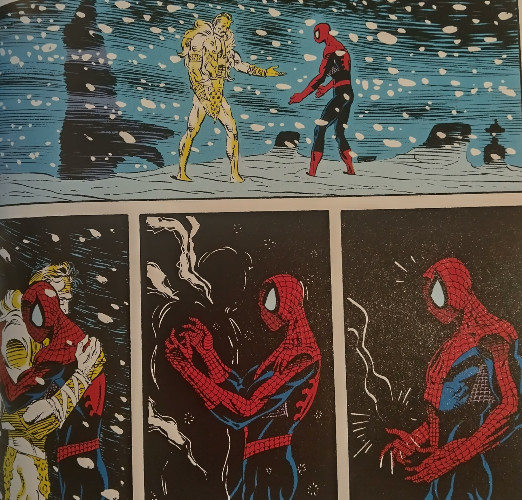
All of this is illustrated wonderfully by Mike Zeck, whose style has evolved since "Last Hunt." Not that his work during "Last Hunt" isn't good–in fact, it's rather excellent–but we see a new side of the artist for this story. Perhaps because this is a graphic novel and not just issues within a comic book series, most of the panels feel broader, allowing Zeck ample opportunity to craft as many details as he can. And while "Last Hunt" is an unashamedly darker tale, with scenes during thunderstorms and in sewers, Soul feels more mystical in nature, and Zeck handles that aspect well, alongside colorist Steve Buccellato. Zeck's work here actually reminded of artist Lee Weeks' style–I feel like they draw faces similarly–almost a glimpse of how a more modern artist like Weeks would handle this early 90s graphic novel.
I can’t say I've ever been a massive fan of mystical elements in Spidey stories, especially when ethereal concepts are bandied about with little explanation as to why they exist. Part of me wanted to know the rules of the story or how the personification of Death happened to show up (or, even, why this Death is different from the version of Death Thanos hangs out with). Perhaps such explanations were not fit for DeMatteis' story, and while the complaint is certainly a minor one, I would have liked some slight exposition. When writers start making comments like "Listen hard for a song of hope...a song of belief in something bigger...that every heart can touch...when it opens in love," my eyes glaze just a bit. It all sounds nice and blissful and perhaps remotely spiritual, but unless you give me something concrete to understand what you're saying, I'm going to struggle to pay attention.
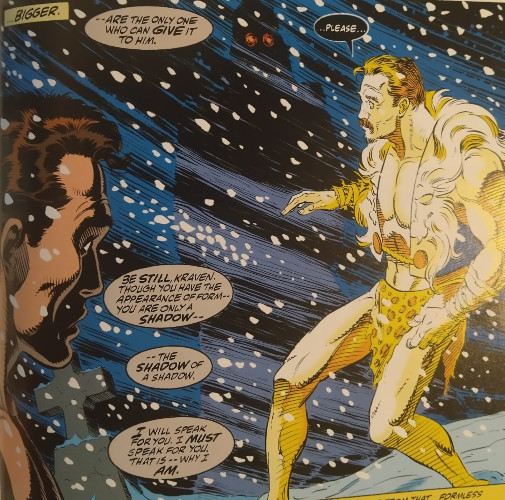
"Soul of the Hunter" is a fantastic follow-up to one of the best Spider-Man stories ever written. Even though DeMatteis wrote this as a response to fans, he should be proud for managing to bring closure to the Spider-Man/Kraven relationship, even if it was only temporary. Partnered with an excellent artist whose work is different yet creatively equal to his illustrations for "Last Hunt," DeMatteis makes something that, on occasion, comes across as a little hokey and weak, but for the most part, serves as a fitting conclusion to a long-running conflict that even the Hunter's resurrection two decades later can hardly tarnish.